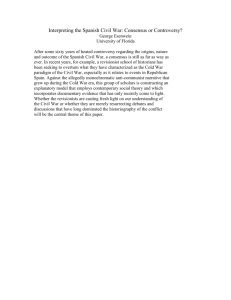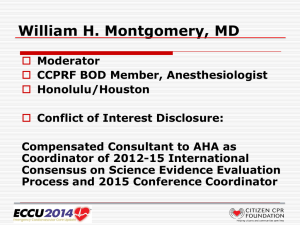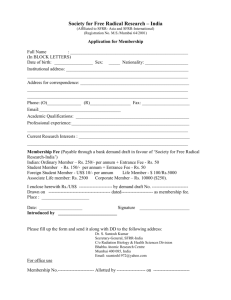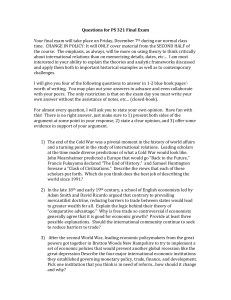Globalisation - The Dangers and the Answers
advertisement
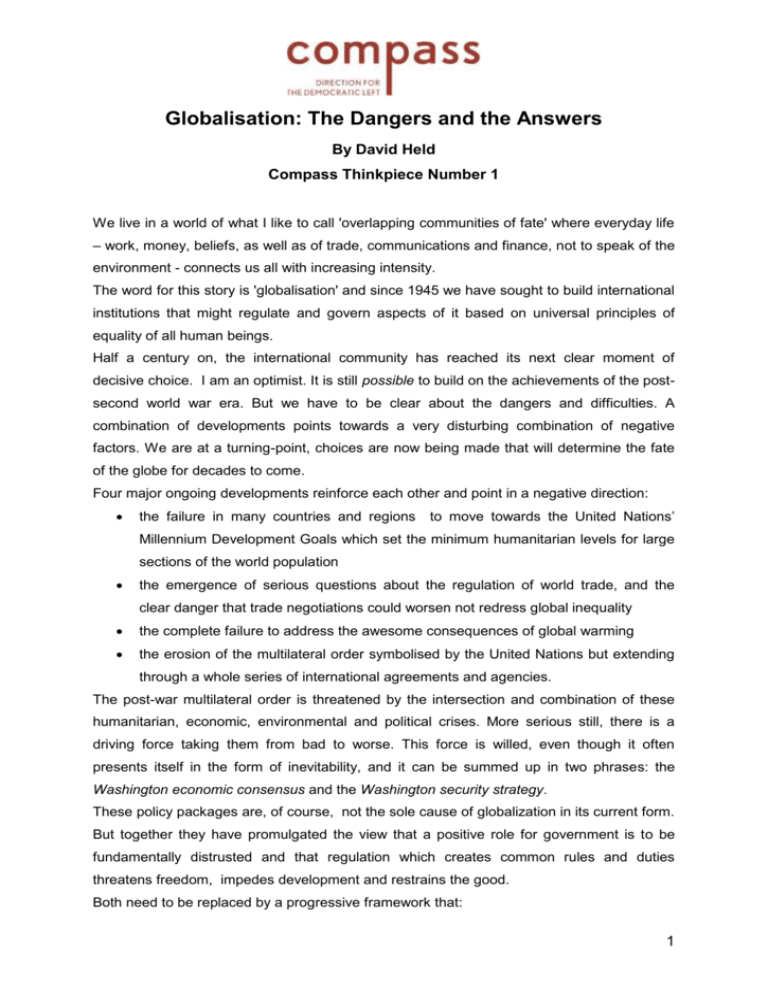
Globalisation: The Dangers and the Answers By David Held Compass Thinkpiece Number 1 We live in a world of what I like to call 'overlapping communities of fate' where everyday life – work, money, beliefs, as well as of trade, communications and finance, not to speak of the environment - connects us all with increasing intensity. The word for this story is 'globalisation' and since 1945 we have sought to build international institutions that might regulate and govern aspects of it based on universal principles of equality of all human beings. Half a century on, the international community has reached its next clear moment of decisive choice. I am an optimist. It is still possible to build on the achievements of the postsecond world war era. But we have to be clear about the dangers and difficulties. A combination of developments points towards a very disturbing combination of negative factors. We are at a turning-point, choices are now being made that will determine the fate of the globe for decades to come. Four major ongoing developments reinforce each other and point in a negative direction: the failure in many countries and regions to move towards the United Nations’ Millennium Development Goals which set the minimum humanitarian levels for large sections of the world population the emergence of serious questions about the regulation of world trade, and the clear danger that trade negotiations could worsen not redress global inequality the complete failure to address the awesome consequences of global warming the erosion of the multilateral order symbolised by the United Nations but extending through a whole series of international agreements and agencies. The post-war multilateral order is threatened by the intersection and combination of these humanitarian, economic, environmental and political crises. More serious still, there is a driving force taking them from bad to worse. This force is willed, even though it often presents itself in the form of inevitability, and it can be summed up in two phrases: the Washington economic consensus and the Washington security strategy. These policy packages are, of course, not the sole cause of globalization in its current form. But together they have promulgated the view that a positive role for government is to be fundamentally distrusted and that regulation which creates common rules and duties threatens freedom, impedes development and restrains the good. Both need to be replaced by a progressive framework that: 1 sustains the enormous enhancement of productivity and wealth that the market and contemporary technology make possible ensures that the benefits are fairly shared addresses extremes of poverty and wealth as part of a commitment to overall security which engages with the causes as well as the crimes of terrorism, war and failed states. I will call the approach that sets itself this task, social democratic globalisation and a human security agenda. The Washington Consensus The Washington Consensus can be defined as an economic agenda which advocates, among other things, free trade, capital market liberalisation, secure property rights, deregulation, the transfer of assets from the public to the private sectors. It has been neoliberal economic orthodoxy for most of the last twenty years in leading OECD countries and prescribed, until recently without qualification, by the IMF and World Bank as the policy basis for developing countries. Some of the proposals and advice of the Washington Consensus may be reasonable in their own terms. Others are not. Taken together, however, they represent too narrow a set of policies to help create sustained growth and equitable development. The evidence is now in and it is clear that it does not work well enough. The dominant economic orthodoxies have failed to generate sustained economic growth, poverty reduction and fair outcomes in many parts of the developing world. In particular it has been found that one of the key global factors limiting the capacity of the poorest countries to develop is the free movement of capital. While tariff liberalisation can be broadly beneficial for low-income countries, rapid capital liberalisation can be a recipe, in the absence of prudential regulation and sound domestic capital markets, “for volatility, unpredictability and booms and busts in capital flows”. As Geoffrey Garrett has shown working at UCLA, countries that have rapidly opened their capital accounts have performed significantly less well in terms of economic growth and income inequality than countries that have maintained tight control on capital movements but cut tariffs. Furthermore, the experience of China and India – along with Japan, South Korea and Taiwan in earlier times – shows that countries do not have to adopt liberal trade or capital market policies in order to benefit from enhanced trade and to grow faster. All these countries have grown relatively fast behind protective barriers, growth which fuelled rapid trade expansion. And as each of these countries has become richer, it has tended to liberalise its trade policy. But as Dani Rodrik, the Harvard economist, has emphasised, the 2 only thing that can be said with certainty is that countries tend to become more open as they become richer – it is not a matter of simple cause and effect. For a country to benefit from growth, its priority should be internal economic integration – the development of its human capital, economic infrastructure and of robust national market institutions. Initially, this needs to be stimulated by state-led economic and industrial policy. The alternative to the Washington Consensus is not a simple endorsement of state-centric development nor is state intervention always progressive and beneficial. Public objectives can be delivered by a diversity of actors, public and private. And the development of civil society – trade unions, citizen groups, NGOs and so on – is an indispensable part of national development. Although there can, of course, be conflicts between economic development and the strengthening of civil society, all societies need significant measures of autonomy to work out their own ways of managing this conflict. Developing nations need policy space to exercise institutional innovations that depart from the orthodoxy of global market integration first and foremost. Similarly, organisations like the WTO need to move their agenda away from a narrow set of policies concerned with market creation and supervision to a broader range of policies which encourage different national economic systems to flourish within a fair and equitable rule-based global market order. Leaving it to markets on their own to resolve problems of resource generation and allocation will perpetuate the vast asymmetries of life chances within and between nation-states and the emergence of global financial flows which can rapidly destabilise national economies. Indeed, pushing back the boundaries of state action and weakening governing capacities in order to increase the scope of market forces in a society will often mean cutting back on services which have offered protection to the vulnerable. The difficulties faced by the poorest and the least powerful - north, south, east and west – will be worsened not improved. The rise of “security” issues to the top of the political agenda reflects, in part, the need to contain the outcomes which such policies help provoke. The Washington Security Agenda The terrorist attack on the World Trade Center and the Pentagon was a defining moment for the history of today's generations. In response, the US and its major allies could have decided that the most important and effective way to defeat the torrent of global terrorism would be to strengthen international law and enhance the role of multilateral institutions. They could have decided it was important that no single power or group should act as judge, jury and executioner. They could have decided that global hotspots like the Israel / Palestine conflict which feed global terrorism should be the main priority for coordinated 3 international efforts. They could have decided that the disjuncture between economic globalisation and social justice needed more urgent attention. They could have decided to be tough on terrorism and tough on the conditions which lead people to imagine that alQaeda and similar groups are agents of justice in the modern world. Instead they have systematically failed to decide any of these things. Since 9/11, the world has become more polarised, international law has become weaker, and the systematic political failings of the Washington Consensus have been compounded by the triumphs of new Washington security doctrines. The rush to war against Iraq in 2003 gave priority to a narrowly conceived security perspective which is at the heart of the new American doctrine of unilateral and pre-emptive war. This agenda contradicts most of the core tenets of international politics and international agreements since 1945. It throws aside respect for political negotiations among states. A single country which enjoys military supremacy to an unprecedented extent has decided under its current president to use that supremacy to respond unilaterally to perceived threats. The new doctrine has many serious implications. Among these are a return to the view of international relations as, in the last analysis, a “war of all against all”. Once this “freedom” is granted to the USA, why not also to Russia or China; India or Pakistan; North Korea or Iran? It cannot be consistently argued that all states bar one must accept limits on their selfdefined goals and that this can be called law. It will not take long for such an approach to become manifestly counter-productive. Narrow vs. broad security agendas What the world needs is a global security agenda that requires three things of governments and international institutions - all currently missing. First, there must be a commitment to the rule of law and the development of multilateral institutions that can prosecute a robust form of international law enforcement. Second, a sustained effort has to be undertaken to generate new forms of global political legitimacy for international institutions involved in security and peacemaking. Third, there must be a head-on acknowledgement that the ethical and justice issues posed by the global polarisation of wealth, income and power, and with them the huge asymmetries of life-chances, cannot be left to markets to resolve. Instead, we are now witnessing a deeply misguided response to terrorism in which the new security agenda of the American neo-conservatives arrogates to the United States the global role of setting standards. Specifically, we need to link the security and human rights agenda in international law; reform the UN Security Council to improve the legitimacy of armed intervention, with 4 credible threshold tests; amend the now outmoded 1945 geopolitical settlement as the basis of decision-making in the Security Council and extend representation to all regions on a fair and equal footing; expand the remit of the Security Council with a parallel Social and Economic Security Council, to examine and, where necessary, intervene in the full gambit of human crises - physical, social, biological, environmental - which can threaten human agency; and found a World Environmental Organisation to promote the implementation of existing environmental agreements and treaties, and whose main mission would be to ensure that the development of world trading and financial systems are compatible with the sustainable use of the world's resources. To reconnect the security and human rights agenda in this way we need a global covenant which encompasses both the fundamental legal humanitarian issues and social and economic well-being, such as basic education and fundamental humanitarian priorities such as clean water and public hygiene. Social democracy at the level of the nation-state means being tough in pursuit of free markets while insisting on a framework of shared values and common institutional practices. At the global level it means pursuing an economic agenda which calibrates the freeing of markets with poverty reduction programmes and the immediate protection of the vulnerable – north, south, east and west. Economic growth can provide a powerful impetus to the achievement of human development targets. But unregulated economic development which simply follows the existing rules and entrenched interests of the global economy will not lead to prosperity for all. Economic development needs to be conceived as a means to an end, not an end in itself. If developed countries especially want swift movement to the establishment of global legal codes that will enhance security and ensure action against the threats of terrorism, then they need to be part of a wider process of reform on these lines that addresses the insecurity of life experienced in developing societies. Do we have the resources to put such a programme into effect? The four major interlocking crises of the multilateral order are evidence of the current lack of political will to confront some of the most pressing global threats. But it cannot be said that we lack the means. A few telling examples make the point. The UN budget is $1.25 billion plus the necessary finance for peacekeeping per annum. Against this, US citizens spend over $8 billion per annum on cosmetics, $27 billion per annum on confectionery, $70 billion per annum on alcohol and over $560 billion per annum on cars. (All these figures are from the late 1990s and so are likely to be much higher now.) Or take the European Union: its citizens spend $11 billion per annum on ice-cream, $150 billion per annum on cigarettes and alcohol, while the EU and the US together spend over $17 billion per annum on pet food. 5 If all OECD agricultural subsidies were removed and spent on the world's poorest peoples this would release some $300 billion per annum. A small shift between military and aid budgets (respectively $900 billion a year globally and $50 billion a year globally) would make a marked difference to the human security agenda. Clearly, the economic resources do exist to put in place reforms to aid the world's poorest and least well-off. The question really is about how we allocate our resources, to whose benefit and to what end. The Argument Laid Out as a Diagram There are four elements to the argument: 1) a critique of the Washington consensus, 2) the way it has now been reinforced by the Washington Security Agenda, 3) the need to replace the Washington Consensus with a Global Social Democratic one, and 4) the need to replace the Washington Security Agenda with a Human Security one. It is important to understand that the four elements are distinct. It is possible to advocate the combination of the Washington Consensus and the Human Security agenda, as a supporter of President Clinton might do. Nonetheless, while the Bush security doctrine only intensifies the negative aspects of the Washington consensus and is not essential to it, it is unlikely that a social democratic consensus could succeed without the reinforcement of a human security agenda. Below, the different elements are spelt out in more detail. 6 7 David Held is Graham Wallace Professor of Political Science and co-director of the Centre for the Study of Global Governance at the LSE. This piece is based on a longer version by the same title for openDemocracy.net which first appeared on their website. The longer version is also published in Debating Globalization, edited by Anthony Barnett, David Held and Caspar Henderson, published by Polity Press in 2005. David Held is also the author of Global Covenant published in 2004 by Polity Press. 8


